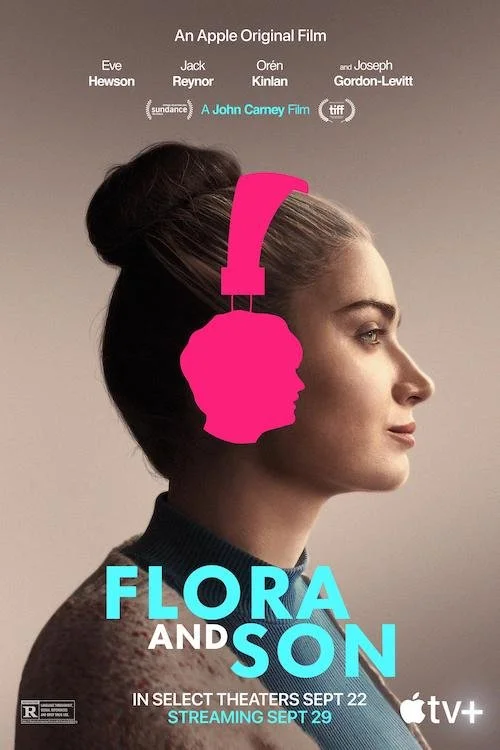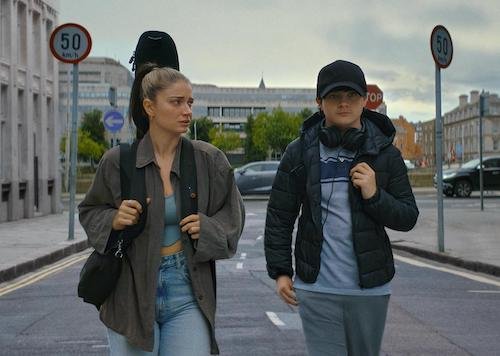Flora and Son
Written by Andreas Babiolakis
In Flora and Son, director John Carney provides an escape for everyday, working-class people via the power of music and love. Wait… he does so in Once, Begin Again, and Sing Street as well. Okay, so this isn’t exactly the first time ever that Carney has tried to lift our spirits via sweet songs and underdog stories, but I’m not going to sit here, gripe, and call Carney a one-trick pony. If he specializes in something, then so be it. His music-based films at least possess their own identities, I must confess. So, back to Flora and Son. Yes, it’s John Carney doing John Carney things, but this time we follow single mother Flora and her problematic son Max (who she shares with her ex-husband Ian) in Dublin. Max is getting into heaps of trouble for his temper and propensity to steal. Flora — at her wit’s end — finds an old acoustic guitar and tries to encourage Max to pick up the instrument as a hobby. When this doesn’t quite work out, she tries to find guidance via a guitar teacher online, which proves to be more therapeutic for her than it is for Max when she finds instructor Jeff, who is stationed in Los Angeles.
This is your usual Carney affair, with original songs scattered throughout Flora and Son that are meant to pick up the soul of the film while the remainder sets the story. Unlike the thoroughly sincere Once or the imaginative Sing Street, Flora and Son aims to be Carney’s take on the Dardenne brothers or Ken Loach: a focus on a struggling parent and/or family, and the system that fails them. These elements (hence, the majority of the story) aren’t fleshed out as nicely as they should be. We get fun-albeit-toxic chemistry between Flora, Max, and Ian, and the butterflies between Flora and Jeff feel real (even regarding the long-distance element of it all). The film tries to get somewhere profound with Max and his behaviour, regarding how far into juvenile delinquency he’s willing to go before finally deciding to reform (don’t forget this is a Carney film, so he never gets that bad). It also vows to fully depict the struggles Flora is going through. I feel like it doesn’t quite accomplish either, given how much it tosses away to gaze upon the sweetness within the grit (needless to say, Carney tries to make a feel-good film while projecting tricky issues and themes, so he doesn’t really pull it off).
Flora and Son tries to be both sweet and hard-hitting, but it kind of fails at the latter.
By the time Flora and Son finishes, it’s clear what all of this build-up was for: a song. Now, now. It isn’t as annoying as it sounds, even though this sounds like such a typical thing for Carney to do. The song actually unites the themes, characters, and situations within Flora and Son quite nicely, but then it is evident why the rest of the film feels so derivative. It seems like Flora and Son stemmed from a concept of this final sequence (or even just the song itself) and that the rest of the film was created to make it exist in a feature film. Either way, this is the least seamless that any Carney film has felt before when it comes to making these songs have a purpose, regardless of how meaningful and strong this song in question actually is. The rest of the film kind of just exists and is nearly instantly forgettable. It can be endearing for an hour and a half, but I guarantee that the only thing that will stick once you are done watching is the music. Flora and Son does have some good laughs, a few tender moments, and even legitimate sorrow, but none of that will be remembered like the tunes will be. It’s the first time that Carney seems to have forgotten how much cinematic weight was needed in order for a music-based film to matter as much as his latest soundtrack.
Andreas Babiolakis has a Masters degree in Film and Photography Preservation and Collections Management from Ryerson University, as well as a Bachelors degree in Cinema Studies from York University. His favourite times of year are the Criterion Collection flash sales and the annual Toronto International Film Festival.






